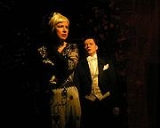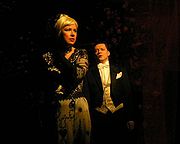
Die Csárdásfürstin
Encyclopedia
Die Csárdásfürstin or A Csárdáskirálynő (literally The Csárdás
Princess; translated into English as The Riviera Girl and The Gipsy Princess) is an operetta
in 3 acts by Hungarian composer Emmerich Kalman
, libretto
by Leo Stein
and B. Jenbach. It premiered in Vienna
at the Johann Strauss Theater, 17 November 1915. Numerous film versions and recordings have been made. The operetta is widely beloved in Hungary, Austria, Germany, all of Europe and particularly in former Soviet Union, where it had been adapted into a hugely popular film. It is arguably Kálmán's most successful work.

Mittel-European Aristocracy is decaying shortly before the outbreak of World War I. In Act I, Silva Varescu, a self-sufficient and professionally-successful cabaret performer from Budapest,is about to embark on a tour of America. Three of her aristocratic "Stage Door Johnnies", named Edwin, Feri and Boni, prefer her to stay. Edwin,unaware that his parents have already arranged a marriage for him back home in Vienna, orders a notary to prepare a promissory note of his expected marriage to Silva within ten weeks. Silva then leaves on her American tour, and Edwin leaves for peacetime military duty. Act II is set just at the time this promissory note is about to expire. Silva visits Edwin's Palace in Vienna, pretending to have married Boni as her entree into his family's society. Edwin is about to be engaged to Stasi, who does not care for him and wishes only an arranged marriage. Boni falls in love with Stasi and Edwin regrets not keeping his promise to Silva sooner. However, Edwin makes the faux pas of informing Silva that his parents would accept Silva ONLY if she pretends to have been divorced from Boni and therefore already entered society via an earlier marriage. Edwin's father separately informs Silva that if she marries Edwin without first having achieved noble rank through some other route, her role in society could be merely that of a GYPSY PRINCESS should she go through with the marriage, Silva realizes that she is better than them and has a brighter future than them. She purposefully embarrasses Edwin and his father, turning her back on them and leaving in the presence of their assembled friends. Act III is set in a Viennese hotel to which Feri has accompanied the cabaret troupe from Budapest, who is about to sail on another American tour with Sylva. As everyone is shows up and recognizes each other, Feri recognizes Edwin's mother as a retired cabaret singer from Budapest whose star once shown prior to Sylva's time. Not realizing that those aristocrats staying behind will soon suffer almost complete decimation during the escalation of the war effort in Austria and Hungary following the assassination of the Crown Prince, Edwin's mother joins the two couples, Sylva/Edwin and Boni/Stasi, all unwittingly heading to safety on this American tour. The curtain falls.
Csárdás
Csárdás is a traditional Hungarian folk dance, the name derived from csárda . It originated in Hungary and was popularized by Roma music bands in Hungary and neighboring lands of Serbia, Slovakia, Slovenia, Burgenland, Croatia, Ukraine, Transylvania and Moravia, as well as among the Banat...
Princess; translated into English as The Riviera Girl and The Gipsy Princess) is an operetta
Operetta
Operetta is a genre of light opera, light in terms both of music and subject matter. It is also closely related, in English-language works, to forms of musical theatre.-Origins:...
in 3 acts by Hungarian composer Emmerich Kalman
Emmerich Kalman
Emmerich Kálmán was a Hungarian-born composer of operettas.- Biography :Kálmán was born Imre Koppstein in Siófok, on the southern shore of Lake Balaton, Hungary in a Jewish family.Kálmán initially intended to become a concert pianist, but because of early-onset arthritis, he focused on composition...
, libretto
Libretto
A libretto is the text used in an extended musical work such as an opera, operetta, masque, oratorio, cantata, or musical. The term "libretto" is also sometimes used to refer to the text of major liturgical works, such as mass, requiem, and sacred cantata, or even the story line of a...
by Leo Stein
Leo Stein (writer)
Leo Stein, born Leo Rosenstein was a playwright and librettist of operettas in the latter part of the 19th and early 20th centuries, including works adapted for a number of Broadway productions....
and B. Jenbach. It premiered in Vienna
Vienna
Vienna is the capital and largest city of the Republic of Austria and one of the nine states of Austria. Vienna is Austria's primary city, with a population of about 1.723 million , and is by far the largest city in Austria, as well as its cultural, economic, and political centre...
at the Johann Strauss Theater, 17 November 1915. Numerous film versions and recordings have been made. The operetta is widely beloved in Hungary, Austria, Germany, all of Europe and particularly in former Soviet Union, where it had been adapted into a hugely popular film. It is arguably Kálmán's most successful work.
Roles
| Role | Voice type | Premiere Cast, November 17, 1915 (Conductor: - ) |
|---|---|---|
| Sylva Varescu | soprano Soprano A soprano is a voice type with a vocal range from approximately middle C to "high A" in choral music, or to "soprano C" or higher in operatic music. In four-part chorale style harmony, the soprano takes the highest part, which usually encompasses the melody... |
Mitzi Günther |
| Edwin Ronald | tenor Tenor The tenor is a type of male singing voice and is the highest male voice within the modal register. The typical tenor voice lies between C3, the C one octave below middle C, to the A above middle C in choral music, and up to high C in solo work. The low extreme for tenors is roughly B2... /baritone Baritone Baritone is a type of male singing voice that lies between the bass and tenor voices. It is the most common male voice. Originally from the Greek , meaning deep sounding, music for this voice is typically written in the range from the second F below middle C to the F above middle C Baritone (or... |
Karl Bachmann |
| Countess Stasi | soprano | Susanne Bachrich |
| Count Boni Káncsiánu | tenor | Josef König |
| Feri von Kerekes | bass Bass (voice type) A bass is a type of male singing voice and possesses the lowest vocal range of all voice types. According to The New Grove Dictionary of Opera, a bass is typically classified as having a range extending from around the second E below middle C to the E above middle C... |
Antal Nyárai |
| Anhilte | contralto Contralto Contralto is the deepest female classical singing voice, with the lowest tessitura, falling between tenor and mezzo-soprano. It typically ranges between the F below middle C to the second G above middle C , although at the extremes some voices can reach the E below middle C or the second B above... |
Gusti Macha |
| Leopold Maria | bass | |
| Oberleutnant von Rohnsdorff | bass | |
| An American | bass | |
Synopsis

- Place: BudapestBudapestBudapest is the capital of Hungary. As the largest city of Hungary, it is the country's principal political, cultural, commercial, industrial, and transportation centre. In 2011, Budapest had 1,733,685 inhabitants, down from its 1989 peak of 2,113,645 due to suburbanization. The Budapest Commuter...
and ViennaViennaVienna is the capital and largest city of the Republic of Austria and one of the nine states of Austria. Vienna is Austria's primary city, with a population of about 1.723 million , and is by far the largest city in Austria, as well as its cultural, economic, and political centre... - Time: shortly before the out-break of the First World War
Mittel-European Aristocracy is decaying shortly before the outbreak of World War I. In Act I, Silva Varescu, a self-sufficient and professionally-successful cabaret performer from Budapest,is about to embark on a tour of America. Three of her aristocratic "Stage Door Johnnies", named Edwin, Feri and Boni, prefer her to stay. Edwin,unaware that his parents have already arranged a marriage for him back home in Vienna, orders a notary to prepare a promissory note of his expected marriage to Silva within ten weeks. Silva then leaves on her American tour, and Edwin leaves for peacetime military duty. Act II is set just at the time this promissory note is about to expire. Silva visits Edwin's Palace in Vienna, pretending to have married Boni as her entree into his family's society. Edwin is about to be engaged to Stasi, who does not care for him and wishes only an arranged marriage. Boni falls in love with Stasi and Edwin regrets not keeping his promise to Silva sooner. However, Edwin makes the faux pas of informing Silva that his parents would accept Silva ONLY if she pretends to have been divorced from Boni and therefore already entered society via an earlier marriage. Edwin's father separately informs Silva that if she marries Edwin without first having achieved noble rank through some other route, her role in society could be merely that of a GYPSY PRINCESS should she go through with the marriage, Silva realizes that she is better than them and has a brighter future than them. She purposefully embarrasses Edwin and his father, turning her back on them and leaving in the presence of their assembled friends. Act III is set in a Viennese hotel to which Feri has accompanied the cabaret troupe from Budapest, who is about to sail on another American tour with Sylva. As everyone is shows up and recognizes each other, Feri recognizes Edwin's mother as a retired cabaret singer from Budapest whose star once shown prior to Sylva's time. Not realizing that those aristocrats staying behind will soon suffer almost complete decimation during the escalation of the war effort in Austria and Hungary following the assassination of the Crown Prince, Edwin's mother joins the two couples, Sylva/Edwin and Boni/Stasi, all unwittingly heading to safety on this American tour. The curtain falls.
Selected recordings
- Anna MoffoAnna MoffoAnna Moffo was an Italian-American opera singer and one of the leading lyric-coloratura sopranos of her generation...
(Sylva), René KolloRené KolloRené Kollo is a German tenor.-Biography:He was born René Kollodzieyski in Berlin and grew up in Wyk auf Föhr. He attended a photography school in Hamburg, although he had always been interested in music, particularly conducting. He did not begin to perform until the mid-50s...
(Edwin), Dagmar Koller (Countess Stasi), Sándor Németh (Baron Káncsiánu), László Mensáros (Kerekes) - Symphonieorchester Graunke, Bert Grund - Eurodisc (1972)

